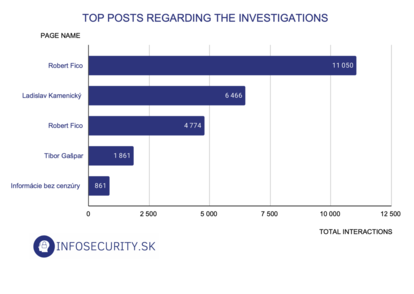DISINFORMATION
Disinformers are accusing government representatives of staging a “police coup”

Infosecurity.sk presents an overview of disinformation trends that have been on the rise in information space in the past two weeks:
- Recent arrests of intelligence officials in Slovakia have sparked allegations of a "police coup" orchestrated by the government.
- Multiple parties are also tying the situation to the upcoming election and are spreading unfounded claims of election manipulation.
- Slovak disinformers exploit the anniversary of the Soviet invasion to draw inappropriate parallels with military cooperation, fueling anti-Western sentiments and distorting perceptions of sovereignity.
The president is being accused of staging a “coup” to destroy the opposition
Recently, numerous senior members of the intelligence community were detained by Slovak police on charges of leading a criminal organisation, abusing their positions of authority, and corruption. The most significant of two ongoing investigations accuses seven people of conspiring to obstruct investigations into corruption cases that go back to the tenure of office of former Prime Minister Robert Fico. The information was made public a week after Tibor Gašpar, the former police chief under Fico and a candidate for a seat in parliament on behalf of Fico's anti-system SMER-SSD party, was detained on charges of corruption and ties to organized crime.
The situation has been quickly utilized by various political actors, especially members of the SMER-SSD party, as a way to discredit the incumbent government officials and accuse them of staging a “police coup” that aims to harm the opposition parties before the elections. One of the main narratives being spread regarding the situation is that the arrests are politically motivated and orchestrated by government officials to benefit the “progressive” parties.
By far the most active actor in spreading this narrative is Robert Fico, a chairman of the SMER-SSD party. In a post, which has accumulated over 17 thousand interactions at the time of writing this article, he alleges that the “appointees” of the progressive parties in the security forces are “destroying the opposition with criminal bullying”. According to Fico, the “coup” has been orchestrated by Slovak President Zuzana Čaputová and interim Prime Minister Ľudovít Ódor.
Other members of the party have also come forward to disseminate the same narrative. Tibor Gašpar called the arrests a “desperate attempt at a police coup” and Ladislav Kamenický went on to alert his Facebook audience that a “police coup has begun”.
The claims of a “coup” have been debunked by the president during a Security Council meeting: "There is no police coup in Slovakia; only criminal investigations are ongoing.” At the same time, Čaputová emphasized that, in contrast to Fico's statements, neither she nor the acting Prime Minister are informed of or approve of any police actions.
She further rejected the claim that she wants to destroy the opposition. It is important to add that Fico has frequently verbally attacked the president referring to her as the puppet of Soros, a hate figure for populists around Central Europe, and an American agent.
Even though these narratives are reactionary, they fit into the long-established narrative of so-called efforts to discredit the political opposition, which is used by anti-system and far-right parties in their pre-election campaigns.
Allegations of election manipulation resurface
Despite providing no proof, Robert Fico and his populist SMER-SSD party frequently caution that Slovakia's upcoming election would be rigged in an attempt to prepare themselves in case the party does not win the elections. In the wake of the recent arrests, the members of the party significantly hardened their rhetoric with regard to this particular narrative, claiming that the “coup” is a way to manipulate the upcoming elections.
In the aforementioned post by Robert Fico, he says that “President Čaputová’s state is crumbling under her hands and fears of manipulation of the election results are growing”. In a similar manner to Fico, Milan Uhrík, an MEP and a chairman of the far-right Republika party, wrote on his Facebook page: “What else is it if not an attempt to eliminate the growing opposition in the election campaign?”
The objectives of spreading unsubstantiated disinformation about a rigged election are the same as those of any other hoax: to spread information chaos, to maintain permanent uncertainty, and to undercut the legitimacy of governmental authorities. In this particular case, the aforementioned narratives also serve as a way for the SMER-SSD party members, several of whom have been charged with corruption-related crimes, to turn the attention away from their actions and undermine the credibility of governmental agencies and security forces, while portraying themselves as martyrs.
Since posts about the supposed “coup” have been prevalent in Slovak information space in the past two weeks, we also looked at them through an optic of a list of disinformation actors in Slovakia. We used the CrowdTangle analysis tool to analyse the most popular posts on Slovak Facebook, including the keyword “coup“. Posts were evaluated based on the total number of interactions (the sum of all reactions, comments, and shares).

The first place belongs to a post published by Robert Fico, in which he accuses President Čaputová of staging the “police coup” and calls her “Soros' Čaputová” once again alleging that she is being controlled by foreign influences. It is important to mention that the President has been one of the main targets of hate speech and disinformation in the Slovak information space practically since her inauguration. Now, the hostile rhetoric against her is the most widespread it has ever been, with both politicians and disinformation sites attacking her. Most of the false claims about the President are built on the false notion that she serves foreign interests, which is completely unsubstantiated.
The second place belongs to the aforementioned post by Ladislav Kamenický, in which he falsely warns the public that a “police coup has begun” thus creating a sense of panic.
The third place belongs to the also already-mentioned post by Robert Fico, in which he accuses the President and prime minister Ódor of orchestrating the alleged “coup” with the aim of destroying the opposition.
The aforementioned post by SMER-SSD member Tibor Gašpar, who has also been a subject of the recent arrests, in which he calls the ongoing investigation a “desperate attempt at a police coup” was the fourth most popular in the past two weeks.
Disinformation site Informácie bez cenzúry (“Information without censorship”) re-shared a Telegram post made by a SMER-SSD party member Ľuboš Blaha, in which he alleges that “there has been an attempted coup” and, similarly to Fico, accusing the President of favouring the Slovak progressive party Progresívne Slovensko (“Progressive Slovakia”), as she is one of the founders and former Vice-Chairwoman of the party. However, she requested the cancellation of her membership and left the party after her election to the presidency. It is important to mention that Blaha is currently banned on Facebook (due to repeated violations of Meta's rules regarding hate speech, bullying and harassment, inciting violence, as well as disinformation), however, many disinformation pages re-share his content on Facebook. He also continues his activity on Telegram and therefore still manages to reach a wider audience.
Disinformers use the anniversary of the invasion of Czechoslovakia to criticise military cooperation with the US
On August 21, 1968, the Soviet Union led Warsaw Pact troops in an invasion of Czechoslovakia to stop reformist attempts in Prague. For more than 20 years to come, Czechoslovakia would be occupied by Soviet forces under strict communist rule and all democratization processes would be suppressed.
On the occasion of the 55th anniversary of this event, Slovak disinformers are trying to exploit the situation for their own purposes, comparing the Soviet occupation with the military cooperation with Slovak allies, especially the USA.
Milan Uhrík wrote in a post: “Today we remember the year 1968. But the Soviets are gone. Now it's time to get rid of American bases on our soil.” By this, he directly compares the occupation of the country to the presence of American troops stationed in Slovakia as NATO’s effort to strengthen the eastern flank. This argument about foreign bases in Slovakia is also constantly used by disinformers, despite the fact that there are no such bases in the country and none are planned to be built.
The arrival of Warsaw Pact troops restricted basic human rights, including the ability to do private business or travel. Such correlations are not at all justifiable and are historically insensitive. Unfortunately, they are also effective in interacting with those parts of the population that are already anti-Western.
Juraj Blanár, a member of the SMER-SSD party, wrote in a post that “just as we did not want the temporary stay of foreign troops then, there is no need for it today” indirectly pointing to NATO troops that are currently stationed in Slovakia. However, the increased presence of these military forces in Slovakia is intended to protect Slovakia from the spillover of the conflict in Ukraine into the borders of NATO member states.
The topic of sovereignty is nothing new among Slovak disinformers. They typically distort the meaning of the word and try to create a false image that Slovakia is losing its sovereignty by integrating into Western structures, and in this case, they are exploiting historical events, which are already a sensitive topic and arouse negative feelings in the public, to achieve it. However, it is important to say that the loss of personal freedoms and state sovereignty, as Slovakia experienced during the Soviet occupation, will never be the same as the presence of dozens of soldiers of Slovak allies tasked with protecting the country.
Project Infosecurity.sk organized by Adapt Institute, which is supported by the Prague office of the Friedrich Naumann Foundation for Freedom, continuously monitors the activities of both Slovak and foreign disinformation actors but focuses mainly on the former. The project activities are built upon daily monitoring of emerging disinformation, hoaxes, and conspiracy theories in the online information space. This approach allows the analysts to identify disinformation posts and narratives that resonated with the public the most, as well as to find out where they originated, and how they spread and evolved on social media. The report takes the form of a bi-weekly summary of arising trends in the spread of malicious information content online. Based on that, Infosecurity.sk can warn the public about emerging and current trends in the field of disinformation, manipulation, and propaganda.

